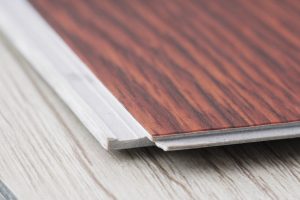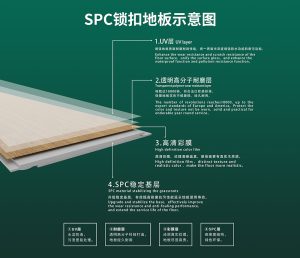When it comes to choosing to floor for your home or business, there are plenty of options available. From hardwood to tile, laminate to carpet, each type of flooring has its own unique advantages and disadvantages. One newer flooring option that has been gaining popularity in recent years is SPC flooring. But what sets SPC flooring apart from other flooring types? Let’s take a closer look.

What is SPC Flooring?
SPC stands for Stone Plastic Composite, which is a type of rigid-core vinyl flooring. It is made up of several layers, including a wear layer, a vinyl layer, an SPC layer, and a pre-attached underpad. The result is a highly durable and stable flooring option that is resistant to scratches, dents, and stains. It is also 100% waterproof, making it ideal for use in bathrooms, kitchens, and other high-moisture areas.
SPC Flooring vs. Other Vinyl Flooring
One of the main advantages of SPC flooring over other vinyl flooring types is its rigidity. SPC flooring is made with a stone-plastic composite layer that gives it added stability and strength. This means that it can withstand heavy foot traffic and is less likely to dent or scratch. Additionally, SPC flooring is thicker than other types of vinyl flooring, which helps to reduce noise levels and provide a more comfortable walking surface.
SPC Flooring vs. Laminate Flooring
Laminate flooring is another popular option for homeowners and businesses. However, SPC flooring has a few advantages over laminate. First and foremost, SPC flooring is 100% waterproof, while laminate is not. This makes SPC flooring a better choice for use in areas with high moisture levels, such as bathrooms and kitchens. Additionally, SPC flooring is more durable than laminate and is less likely to scratch or dent. It is also easier to clean and maintain.

SPC Flooring vs. Hardwood Flooring
Hardwood flooring is a classic and timeless option for flooring. However, it does have some drawbacks, particularly when it comes to maintenance and durability. Hardwood floors are susceptible to scratches, dents, and water damage. They also require regular maintenance, such as sanding and refinishing. SPC flooring, on the other hand, is much more durable and requires minimal maintenance. It is also more affordable than hardwood flooring.
Conclusion
Overall, SPC flooring offers many advantages over other flooring types. Its waterproof and durable nature makes it an ideal choice for high-moisture areas, while its rigidity and thickness provide added stability and comfort. Whether you’re renovating your home or updating your business space, SPC flooring is definitely a flooring option worth considering.

